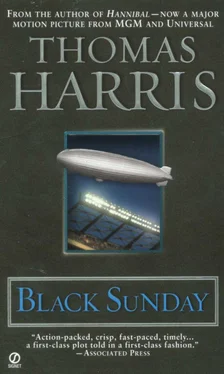The railing of Box 40 is constructed of iron pipe. The ends are capped. These caps should be removed and the interior of the pipes examined immediately before the president’s arrival.
The box contains one telephone terminal box. I am advising Signal Corps on details. (Memo to Signals attached.) Diagram A-4, stadium overview and seating chart, shows individual agent assignments and areas of responsibility.
Our radio frequency is clear.
Details of egress are subject to modification pending our observation of crowd flow at the Sugar Bowl game December 31.
Jack Renfro was a careful and conscientious man, skilled at his trade. He had learned the stadium by heart. But as he catalogued its dangers, he never once looked up at the sky.
LANDER FINISHED THE BOMB TWOdays after Christmas. Its sleek skin, midnight blue and bearing the bright insignia of the National Broadcasting System, reflected the harsh garage lights as it lay in its loading cradle. The clamps that would fasten it to the gondola of the blimp hung from the upper rim like open hands, and the electrical connections and backup fuse were taped in neat coils on the top. Inside the skin, the 1,316.7 pounds of plastic explosive rested in two great slabs of precise thickness, curving behind the layers of bristling darts. The detonators were packed separately, ready to be plugged into place.
Lander sat staring at the great bomb. He could see his reflection distorted on its side. He thought that he would like to sit on it now, and plug in the detonators and hold the wires like reins, touch them to the battery and ride the mighty fire-bloom into the face of God. Sixteen days to go.
The telephone had been ringing for some time when he answered it. Dahlia was calling from New Orleans.
“It’s finished,” Lander said.
“Michael, you’ve done a beautiful job. It’s a privilege to watch you.”
“Did you get the garage?”
“Yes. It’s near the Galvez Street wharf. Twenty minutes from New Orleans Lakefront Airport. I’ve driven the route twice.”
“You’re sure it’s big enough.”
“It’s big enough. It’s a walled-off section of a warehouse. I’ve bought the padlocks and put them on. Now may I come home to you, Michael?”
“You’re satisfied?”
“I’m satisfied.”
“With the airport, too?”
“Yes. I had no trouble getting in. I can make it in the truck when the time comes.”
“Come home.”
“I’ll see you late tonight.”
She did well, Lander thought as he hung up the telephone. Still, he would have preferred to make the arrangements in New Orleans himself. There had been no time. He still had to fly a National Football Conference playoff game and the Sugar Bowl in New Orleans before the Super Bowl. His time was used up.
The problem of moving the nacelle to New Orleans had worried him, and the solution he found was less than ideal. He had leased a two-and-one-half-ton truck, which now stood in his driveway, and he had engaged two bonded professional truck drivers to take it to New Orleans. They would leave tomorrow. The back of the truck would be sealed, and even if the drivers did see the device they would not know what it was.
Putting the bomb in the hands of strangers made Lander uneasy anyway. But there was no help for it. Fasil and Dahlia could not drive the truck. Lander was certain that the authorities had broadcast their descriptions in the Northeast. Fasil’s forged international driving license was sure to attract attention if he were stopped by the police. Dahlia would be very conspicuous at the wheel of a big truck. She would be ogled at every step. Besides, Lander wanted Dahlia to be with him.
If he could have trusted Fasil to go to New Orleans, Dahlia would be here now, Lander thought bitterly. He had no confidence in Fasil since the Arab announced that he would not be present at the strike. Lander had enjoyed the contempt for Fasil that flashed in Dahlia’s eyes. Supposedly Fasil was off arranging for some muscle to be employed at the airport—Dahlia had seen to it that he and Lander were not left in the house together.
One item remained on Lander’s checklist of materials—a tarpaulin to tie down over the nacelle. It was four forty-five p.m. The hardware store was still open. He just had time to make it.
Twenty minutes later, Margaret Feldman, formerly Margaret Lander, parked her Dart stationwagon beside the big truck in Lander’s driveway. She sat for a moment, looking at the house.
This was the first time she had seen it since her divorce and remarriage. Margaret felt some reservations about coming, but the bassinet and baby carriage were rightfully hers, she would need them in a few more months, and she intended to have them. She had called first to make sure Michael was not at home. She did not want him crying after her. He had been a strong and proud man before he was broken. For the memory of that man, she still had a great affection, in her fashion. She had tried to forget his sick behavior at the end. She still dreamed about the kitten, though, still heard it in her sleep.
Reflexively Margaret glanced in her compact mirror, patting her blond hair and checking her teeth for lipstick before getting out of the car. It was as much a part of her routine as turning off the ignition. She hoped she would not get dirty loading the carriage and bassinet into the stationwagon. Really, Roger should have come with her. But he did not feel right about going into Lander’s house when Lander was not there.
Roger had not always felt that way, she thought drily. Why had Michael tried to fight? It was over anyway.
Stooping in the thin snow on the driveway, Margaret found that the lock on the garage had been replaced with a new, stronger one. She decided to go through the house and open it from the inside. Her old key still fit the front door. She had intended to go straight through to the garage, but once inside the house her curiosity was aroused.
She looked around. There was the familiar spot on the carpet in front of the TV, residue of the children’s countless Kool-Aid drippings. She had never been able to get it clean. But the living room was neat and so was the kitchen. Margaret had expected a litter of beer cans and TV dinner trays. She was a little piqued at the neatness of the house.
There is a guilty thrill in being alone in someone else’s house, particularly the home of a familiar person. Much can be felt in the arrangement of a person’s belongings, and the more intimate the belongings, the better. Margaret went upstairs.
Their old bedroom told her little. Lander’s shoes were in a straight line in the closet, the furniture was dusted. She stood looking at the bed and smiled to herself. Roger would be angry if he knew what she was thinking about, did think about sometimes, even with him.
The bathroom. Two toothbrushes. A tiny wrinkle appeared between Margaret’s eyes. A shower cap. Face creams, body lotion, bubble bath. Well, well. Now she was glad she had violated Lander’s privacy. She wondered what the woman looked like. She wanted to see the rest of her things.
She tried the other bedroom, then opened the playroom door. Margaret stood wide-eyed, staring at the spirit lamp, the wall hangings, candle holders and the great bed. She walked to the bed and touched the pillow. Silk. Well, la-de-da! she said to herself.
“Hello, Margaret,” Lander said.
She spun around with a gasp. Lander stood in the doorway, one hand on the knob, the other in his pocket. He was pale.
“I was just—”
“You’re looking well.” It was true. She looked splendid. He had seen her in this room before, in his mind. Crying out to him like Dahlia, touching him like Dahlia. Lander felt a hollow ache inside. He wished Dahlia were here. Looking at his ex-wife, he was trying to see Dahlia, needed to see Dahlia. He saw Margaret. She brightened the air around her.
Читать дальше












